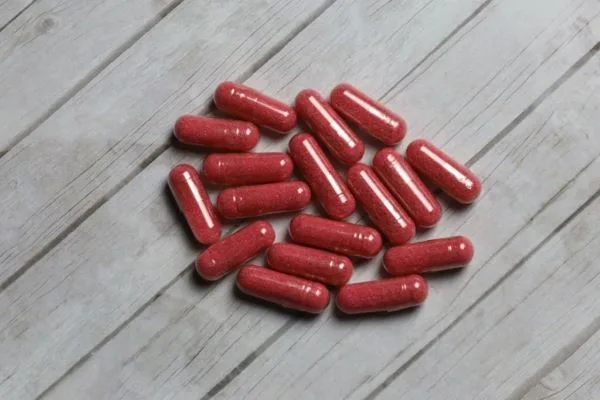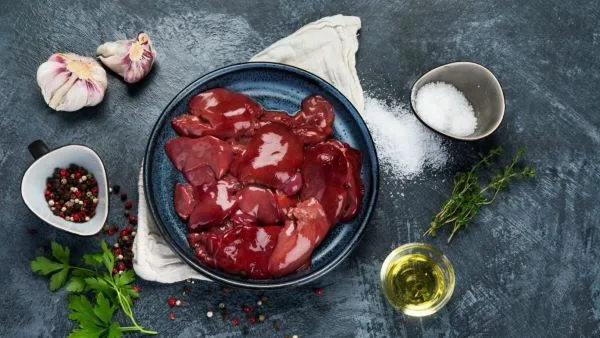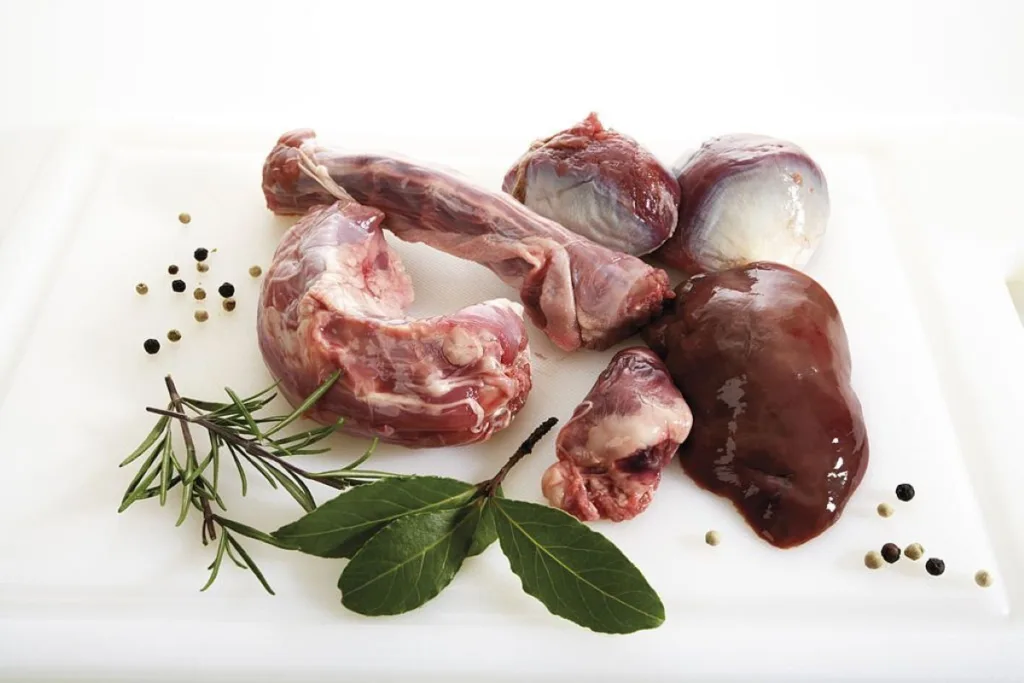The modern diet is a marvel of convenience. With a few taps on a screen, many food options can be delivered right to our doorsteps.
Yet, as we revel in this age of abundance, many of us are unknowingly malnourished, missing out on essential nutrients our ancestors thrived on.
Recent studies suggest that up to 92% of the U.S. population has at least one vitamin or mineral deficiency. Shocking, isn’t it?
Here, enter organ meat supplements. These nutrient-dense powerhouses might be the missing link in our diets, bridging the gap between modern convenience and ancestral nutrition. Read on if you’ve ever wondered how to reclaim some of that lost vitality.
The answer might surprise you.
The Powerhouse of Nutrition: Missing Link in Your Diet
Organ meats, often called “offal,” have been consumed by our ancestors for centuries and are considered nature’s multivitamin.
These parts of the animal are densely packed with nutrients, often more so than the muscle meat we commonly consume. Each organ offers a unique nutrient profile from the liver to the kidney that can complement and enhance our modern diets.
Beyond Common Nutrients
While most of us are familiar with vitamins like C and D, organ meats introduce us to a broader spectrum of nutrients. For instance, the liver contains vitamins A, B12, and iron.
Are Folate and B12 in pregnancy crucial for the baby?
On the other hand, the heart is abundant in CoQ10, an essential compound for energy production and heart health. These are just the tip of the iceberg regarding the nutritional offerings of organ meats.
Bioavailability Matters
One of the standout features of organ meat supplements is their bioavailability. This term refers to how easily our bodies can absorb and utilize the nutrients from a given source.
The nutrients in organ meats are in a form that our bodies recognize and can use efficiently, making them superior to many synthetic supplements on the market.
A Solution to Modern Dietary Gaps
Our modern diets, while abundant, often lack the diversity of nutrients our bodies crave. With the rise of processed foods and a decline in the consumption of whole foods, many of us are missing out on essential nutrients.
Organ meat supplements can bridge this gap, providing a concentrated source of vitamins, minerals, and amino acids often scarce in today’s meals.

From Traditional Diets to Modern Supplements: A Historical Perspective
Long before the advent of modern medicine and dietary supplements, our ancestors recognized the value of organ meats. In many cultures, these parts of the animal were revered and reserved for the elders, warriors, or expectant mothers, acknowledging their potent nutritional benefits.
From the Maasai tribe in Africa consuming raw liver for vitality to ancient Chinese medicine prescribing organ meats for specific ailments, the importance of these foods is deeply rooted in our history.
The Shift Away from Organ Meats
As societies evolved and food became more industrialized, the consumption of organ meats began to wane. The rise of convenience foods and changing culinary preferences pushed these nutrient-dense foods to the periphery of our plates.
Over time, many in the Western world began to view organ meats as “lesser” cuts, opting for muscle meats and processed foods instead.
The Resurgence of Nutrient-Dense Foods
In recent years, there’s been a growing awareness of the nutritional gaps in modern diets. This realization has sparked a resurgence in consuming whole, nutrient-dense foods.
Organ meats, with their rich nutrient profiles, have made a comeback, albeit in a different form for many: supplements.
These supplements capture the essence of organ meats, providing a convenient way for modern consumers to reap their benefits without necessarily cooking or consuming the whole organ.
The Modern Appeal of Organ Meat Supplements
For those who might be squeamish about the idea of eating liver or heart, supplements offer an accessible alternative. They provide a concentrated dose of the nutrients in organ meats without culinary preparation.
Moreover, for individuals with specific dietary restrictions or preferences, these supplements ensure they don’t miss out on the unique nutritional offerings of organ meats.
The Top 3 Organ Meats and Their Benefits
While each organ meat boasts its unique nutrient profile, it forms a symphony of vitamins, minerals, and amino acids that can complement and enhance our modern diets.
By understanding the specific benefits of each organ, individuals can tailor their supplementation to address personal health goals or deficiencies.
The Liver: Nature’s Detoxifier
The liver is a nutritional powerhouse, often considered the king of organ meats. It plays a pivotal role in our body’s detoxification processes, and its nutrient profile is equally impressive.
Rich in vitamin A, B12, and iron, liver supplements can support energy production, vision, and immune function. Additionally, the liver is a fantastic source of bioavailable copper, an essential mineral that aids in collagen formation and iron absorption.
Check the differences in Collagen vs Creatine.
The Heart: The Muscle of Life
The heart, a symbol of love and vitality, is more than just a metaphorical powerhouse. Nutritionally, it’s a treasure trove of CoQ10, an essential compound for energy production and heart health.
This organ is also a rich source of B vitamins, particularly B12, which plays a crucial role in nerve function and the formation of red blood cells. Consuming heart supplements can support cardiovascular health and boost overall energy levels.
The Kidney: A Filter and More
While perhaps less celebrated than the liver or heart, the kidney holds its own in the nutritional arena. Known for its role in filtering waste from our blood, the kidney is also a rich source of selenium, a powerful antioxidant that supports thyroid function and combats oxidative stress.
Additionally, kidney supplements can provide a concentrated source of riboflavin (Vitamin B2), which aids in energy production and maintaining healthy skin.

Incorporating Organ Meat Supplements into a Balanced Lifestyle
Before diving into the world of organ meat supplements, it’s essential to understand your unique nutritional needs.
Everyone’s body is different, and while some might benefit from a boost in iron from liver supplements, others might need the rich CoQ10 content found in heart supplements. Consulting with a nutritionist or health professional can provide personalized guidance.
Starting Slowly
If you’re new to organ meat supplements, starting slowly is wise. Introducing a new supplement into your diet can sometimes lead to mild digestive discomfort.
Begin with a lower dose than recommended and gradually increase as your body acclimates. This approach ensures comfort and allows you to monitor how your body responds to each supplement.
Pairing with Other Foods
Organ meat supplements can be paired with various foods to enhance their absorption and effectiveness. For instance, taking liver supplements alongside vitamin C-rich foods like citrus fruits or bell peppers can boost iron absorption.
Similarly, consuming fats like avocados or olive oil with your supplements can aid in absorbing fat-soluble vitamins.
Consistency is Key
Like any dietary change, consistency is crucial when incorporating organ meat supplements. It’s not about a one-time mega-dose but about consistent, daily intake.
Over time, this regular supplementation can lead to noticeable improvements in energy levels, skin health, and overall vitality.
Listening to Your Body
Lastly, always listen to your body. Adjusting or reconsidering your choices is essential if you notice any adverse reactions or feel a particular supplement isn’t right.
Remember, the goal is enhanced health and well-being, and that journey is deeply personal and individual.
Debunking Myths Surrounding Organ Meat Supplements
Myth 1: Organ Meats Store Toxins
One of the most pervasive myths surrounding organ meats, particularly the liver, is that they store toxins. In reality, the liver acts as a filter, processing and neutralizing harmful substances but not storing them.
Instead, it stores essential vitamins and minerals. Organ meat supplements, especially from high-quality sources, are safe and packed with nutrients, not toxins.

Myth 2: They’re High in Cholesterol, Hence Bad for the Heart
While it’s true that organ meats contain cholesterol, the understanding of dietary cholesterol’s role in heart health has evolved.
Recent research suggests that consuming dietary cholesterol doesn’t significantly impact blood cholesterol levels or heart disease risk for most people. Heart supplements, rich in CoQ10, can support cardiovascular health.
Myth 3: Organ Meat Supplements are Unnatural
Some argue that consuming organ meats in supplement form is unnatural. However, creating these supplements often involves freeze-drying the organs to preserve their nutrient content, making them a concentrated source of the same nutrients in whole organ meats.
It’s a modern solution to ensure we receive the benefits of these ancient foods.
Myth 4: All Organ Meat Supplements are the Same
Not all organ meat supplements are created equal. The quality can vary based on the animal’s diet, upbringing, and the processing method. Choosing high-quality supplements from reputable sources is essential to ensure you’re getting the maximum nutritional benefits.
Myth 5: They’re Only for Those with Deficiencies
While organ meat supplements can indeed help address specific nutrient deficiencies, they’re not exclusively for those with health issues.
Even individuals with balanced diets can benefit from the unique nutrient profiles of organ meats, enhancing overall health and vitality.
Final Words
In our quest for optimal health in the modern world, bridging the gap between contemporary convenience and ancestral nutrition is essential.
Organ meat supplements offer a potent solution, encapsulating the dense nutrition our forebears relied upon. From the liver’s detoxifying prowess to the heart’s energetic support, these supplements reintroduce vital nutrients often missing in today’s diets.
By debunking myths, understanding the unique benefits of each organ, and incorporating them thoughtfully into our routines, we can harness the power of nature’s multivitamins.
As we navigate the complexities of modern nutrition, let’s remember the age-old wisdom of organ meats and embrace a path to balance, vitality, and holistic well-being.

I am a health and wellness enthusiast working in a Pittsburgh-based wellness clinic. My primary role as a consultant is to tailor a balanced lifestyle for my patients, where positive steps and potent supplements play a synergistic role.

